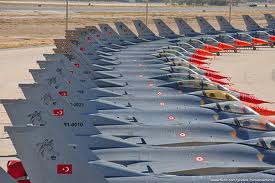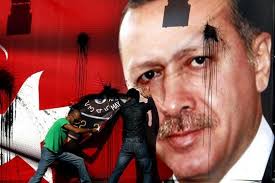By Sunday’s Zaman
Turkey’s policies concerning Syria have eroded the country’s international position more than any other factor due to their encouragement of radical jihadists in the fight against Syrian President Bashar al-Assad, stirring up of sectarian conflicts and mismanagement of relations with the Syrian Kurds and simultaneously damaging its relations with Russia, the US and the EU.
Leaving its traditional allies aside, Turkey has gotten closer with Saudi Arabia and there are talks about a possible military intervention into Syria with Riyadh to protect their interests. Such a dangerous military intervention may have even more serious consequences for Turkey and Saudi Arabia, as well as for the region.
The “cessation of hostilities” agreement on Syria, effective as of Feb. 27, may be a chance for Turkey to alter a foreign policy that has dragged the country into a serious risk of war with regional actors, leading to lost friends and allies, a major refugee influx and an increased threat from terrorism. However, some analysts argue that Turkey’s foreign policy in Syria may be past the point of no return.
Theodore Karasik, a senior advisor at Dubai-based Gulf State Analytics, has told Sunday’s Zaman that Turkey needs to “stop playing games” in Syria and “be serious.”
“Ankara has been negligent across the board when dealing with the multi-level war to the country’s south by enabling extremists without thinking through the policy ramifications as well as taunting the US and Europe by putting preconditions on access to Turkey for any spectrum of operations from the country,” Karasik said.
Criticizing Ankara for threatening Europe with more migrants, Karasik said this kind of behavior is “counterproductive.” Karasik expects that “Kurds of all stripes” are going to be a determining factor in the future of Syria and Assad is not leaving his post anytime soon.
“Turkey needs to look in the mirror and ask whether Ankara’s policies are sustainable or whether all will blowback. The country could divide geographically and on various political and religious interests. Daesh [an Arabic acronym for the Islamic State of Iraq and the Levant] and Kurdish extremists are making themselves heard. A military coup is not impossible. Overall, one Turkish toe in Syria is not recommended at this time. The situation is potentially explosive,” Karasik warned.
Designating a special envoy for Syria
In a recent conversation with Sunday’s Zaman, veteran Turkish diplomat Faruk Loğoğlu said: “The eye of the storm is shifting away from Syria towards Turkey. Ankara must therefore change course and do it now.” He said the agreement to cease hostilities creates a window of opportunity for Turkey to make the necessary policy changes. According to Loğoğlu, Ankara can maintain its opposition to the Assad regime but leave his fate up to Syrians. He suggested that the Syrian Kurdish Democratic Union Party (PYD) issue should be separated from the Syrian conflict and Turkey should say that it will not fire on PYD positions if it ceases its attacks on Turkish interests. Loğoğlu recommends that Turkish Prime Minister Ahmet Davutoğlu designate a well-known personality as “special envoy” for Syria to disseminate to all Turkish parties’ views and priorities. “The Turkish government owes such a policy shift to our people and to the Syrian people. Were Turkey to put its weight on the side of peace and reconciliation, it would be more powerful and effective than any other factor in ending the Syrian conflict. Seizing the current window of opportunity would determine not only Syria’s future but also the future of Turkey in the region,” he said.
Jonathan Schanzer, vice president of research at the US-based think tank Foundation for Defense of Democracies, told Sunday’s Zaman that Turkey’s foreign policy in Syria could be past the point of no return. “It has played a supporting role in aiding and arming a range of anti-regime factions, including some that are jihadis. The border with Syria is a hotbed of illicit finance and trafficking. And although Ankara has curtailed some of this under pressure from Washington, the activity continues today,” claimed Schanzer.
According to Schanzer, Ankara now has a clear conflict of interest. “If it completely halts support to its proxies, it will yield ground to Assad, Russia and the PYD. All three are foes. And the US is doing very little to help Turkey erode its power. With little support coming from other quarters, Ankara is acting in its own self-interest. The problem is: This appears to be working against that of the US in some ways. In short, Turkey is exacerbating the Syria conflict. But to be fair, there are few positions Turkey could adopt to weaken its foes that would not create complications for the West in what has increasingly become a global conflict,” he added.
A political analyst on Islamic extremism and a former CIA official, Graham E. Fuller, wrote on his website on Feb. 18 that Ankara should acknowledge the reality that Assad is not going to fall anytime soon and that what might come after Assad would be likely to be far worse than him. He suggested that Turkey would be better off working with the US, Russia and the EU and rejecting Saudi Arabia’s “absurd vision of a massive international Sunni army seizing control of Damascus.”
As another policy suggestion, Fuller recommended that Ankara return to its earlier policy of standing above sectarian struggle in the region. He suggested improving relations with Iran and Iraq, cooperating with the other Gulf States on a non-sectarian basis, prioritizing the restoration of Turkish relations with Russia and to stop trying to drag NATO into unwise confrontations with Russia. Fuller also suggested that Ankara prioritize close relations with all Kurdish elements in the region which, he says, would also better serve Turkey’s interests.



















